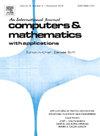涉及分布阶算子的广义分数阶反应扩散模型的有效数值求解方法研究及稳定性分析
IF 2.9
2区 数学
Q1 MATHEMATICS, APPLIED
引用次数: 0
摘要
在本文中,我们研究了一个涉及分布阶算子的广义分数反应扩散模型。提出了一种有效的混合方法来求解该模型。采用L1近似对时间变量进行离散,采用混合有限元法对空间变量进行离散。对该方法进行了详细的误差分析和稳定性分析。此外,我们证明了该方法的计算精度为O(h2+(Δt)3−ξmax)阶。为了验证和评价数值方法,进行了三个数值实验,并以图表的形式给出了结果。本文章由计算机程序翻译,如有差异,请以英文原文为准。
A study of an efficient numerical method for solving the generalized fractional reaction-diffusion model involving a distributed-order operator along with stability analysis
In this manuscript, we study a generalized fractional reaction-diffusion model involving a distributed-order operator. An efficient hybrid approach is proposed to solve the presented model. The L1 approximation is utilized to discretize the time variable, while the mixed finite element method is employed for spatial discretization. A detailed error and stability analysis of the proposed method is provided. Furthermore, we prove that the computational accuracy achieved by the proposed approach is of order . To validate and evaluate the numerical approach, three numerical experiments are conducted, with results presented through graphs and tables.
求助全文
通过发布文献求助,成功后即可免费获取论文全文。
去求助
来源期刊

Computers & Mathematics with Applications
工程技术-计算机:跨学科应用
CiteScore
5.10
自引率
10.30%
发文量
396
审稿时长
9.9 weeks
期刊介绍:
Computers & Mathematics with Applications provides a medium of exchange for those engaged in fields contributing to building successful simulations for science and engineering using Partial Differential Equations (PDEs).
 求助内容:
求助内容: 应助结果提醒方式:
应助结果提醒方式:


